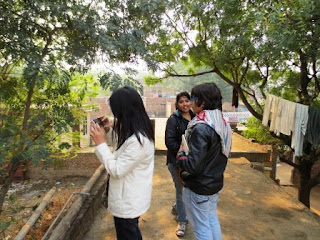The village of Bandhawari is a very peaceful place I feel. It is located outside of Delhi city, and it is surrounded by dry sand and trees, which reminds me of one of South Australia’s villages. People in the village lead a slow life. It is totally different from New Delhi city. The Action Center for Transformation (ACT) is now helping them to create sustainable businesses for an income and educating their children.
ACT is working on two projects in the Bandhawari Village. One of them is a community library, which is still under construction, The library will be a important meeting place where the different castes Harijan and the Gujjars come and learn together. Another program is the empowerment and development of women lives. The women in village are taught the skill of making paper crafts, which they sell to earn some money. I like this project a lot. This project has two main objectives. One of them is that the women can make their money by selling their products and even by teaching their skills to someone. So now they can keep that skills and use that skills to start their own businesses. The second objective is about caring for the earth as they are making products from discarded things such as newspapers. They are recycling the papers. In these days, global warming is one of the biggest problems we are facing. So, to recycle papers is one of good ways to solve this problem. (I don’t know it is solving or not, but I am sure that recycling papers is a much better alternative than to use new pure papers instead because we do not have to cut down more trees).
The women in village can also go on to teach school kids about the problem and how we can live harmoniously with our land without destroying it. Through this, the women in the village are now involved in the solving of global problems and not just confined to their village. That’s so fabulous!
I was very surprised at the village because they had clean water and toilets. Before visiting the village, I heard that people in the village were under poverty line. However, their lives are actually much better than what I expected. They even serve us very nice chai. They were very warm and friendly. They were very happy and enjoyed their lives in the village.
ACT is working on two projects in the Bandhawari Village. One of them is a community library, which is still under construction, The library will be a important meeting place where the different castes Harijan and the Gujjars come and learn together. Another program is the empowerment and development of women lives. The women in village are taught the skill of making paper crafts, which they sell to earn some money. I like this project a lot. This project has two main objectives. One of them is that the women can make their money by selling their products and even by teaching their skills to someone. So now they can keep that skills and use that skills to start their own businesses. The second objective is about caring for the earth as they are making products from discarded things such as newspapers. They are recycling the papers. In these days, global warming is one of the biggest problems we are facing. So, to recycle papers is one of good ways to solve this problem. (I don’t know it is solving or not, but I am sure that recycling papers is a much better alternative than to use new pure papers instead because we do not have to cut down more trees).
The women in village can also go on to teach school kids about the problem and how we can live harmoniously with our land without destroying it. Through this, the women in the village are now involved in the solving of global problems and not just confined to their village. That’s so fabulous!
I was very surprised at the village because they had clean water and toilets. Before visiting the village, I heard that people in the village were under poverty line. However, their lives are actually much better than what I expected. They even serve us very nice chai. They were very warm and friendly. They were very happy and enjoyed their lives in the village.



